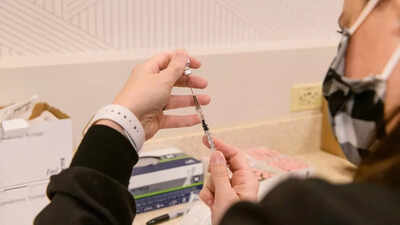ARTICLE AD BOX

From wild claims that they can alter your DNA to worries about “turbo cancer” and vaccine shedding, most of us have seen sensational headlines about mRNA vaccines. These ideas, no matter how impressive they are, often leave us with a plethora of confusion.
Can the vaccines really alter DNA? Or can it trigger turbo cancer? What really are the aftereffects of the vaccines?Here’s the truth: mRNA vaccines do not change your DNA, do not cause aggressive cancers, and do not emit anything that harms others. Trusted health organizations, scientists, and regulators have thoroughly debunked these myths. And now, we’re here with this guide to help you understand what’s true and what’s not.
Busting mRNA vaccine myths: One scientific fact at a time
Myth 1: mRNA shots alter your DNA
This myth is at the heart of many fears. The truth? mRNA never enters the cell’s nucleus, where our DNA lives, so it cannot change your genes. Even some researchers who explored potential DNA integration warn that the risk is no greater than natural mutations we experience daily. Additionally, expert bodies like Australia’s Therapeutic Goods Administration have confirmed there’s no contamination with extra DNA.
Myth 2: They were rushed and unsafe
While development was fast, that doesn’t mean corners were cut. The COVID-era mRNA vaccines went through thorough testing and regulatory review.
Steps were indeed accelerated or overlapped, but none were skipped. Plus, mRNA tech has been under development for years before the pandemic, allowing fast but careful vaccine creation. Researchers had decades of mRNA vaccine knowledge, and trials followed strict safety rules, just sped up by global urgency. Real-world safety data, collected from millions, confirms that most side effects are mild and temporary, like sore arms or tiredness.

Myth 3: They cause “turbo cancer” or long-term harm
Some conspiracy theories claim a sudden wave of aggressive cancers is tied to mRNA shots. This so-called “turbo cancer” idea is not supported by any cancer research.
No evidence links the vaccines to new cancers, progression, or recurrence. According to the US National Cancer Institute, "there is no evidence that COVID-19 vaccines cause cancer, lead to recurrence, or lead to disease progression."
Myth 4: mRNA vaccines make you shed spike proteins
The theory of "vaccine shedding" comes from live-virus vaccines, not mRNA ones. “Vaccine shedding” can happen only with certain live virus vaccines, and none of the approved mRNA vaccines are in that category; they carry no virus.
Since mRNA vaccines have no live virus, there’s no shedding. This doesn’t apply to mRNA vaccines.
Myth 5: mRNA vaccines affect your fertility or cause birth issues
Factually, no evidence supports this. Data and research show mRNA vaccines are safe for people trying to conceive, pregnant individuals, and breastfeeding mothers. In fact, antibodies may even pass to the baby via breast milk, offering protection. Health authorities also confirm there's no evidence linking these vaccines to fertility issues in men or women.
Myth 6: They don’t prevent transmission or are useless
While no vaccine is perfect, COVID-19 mRNA vaccines dramatically reduce the risk of severe illness and death. Contrary to early misconceptions, they also lower the chance of spreading.
Myth 7: Serious side effects pile up after vaccination
Serious reactions are extremely rare. For example, anaphylaxis happens at around 2–5 per million doses, manageable when monitored properly. And while some cases of myocarditis (heart inflammation) were reported in younger males, the risk is still much lower than from an actual COVID-19 infection, and most people recover fully.
Why do these myths still persist?
These myths, like altered DNA or “turbo cancer,” often thrive because of fear, sensational headlines, and the speed of social media. A survey across European nations shows a notable segment of people believe vaccines are poorly tested or risky. But a growing number of people also express confidence in vaccines when presented with clear facts.
What real-world data tell us?
Even as science affirms mRNA vaccine safety and value, political decisions are affecting their future.
The US government recently cut $500 million in funding for mRNA vaccine research, including contracts with Moderna, sparking concern among scientists that this could hinder preparation for future pandemics.
Why trust mRNA vaccines?
mRNA vaccines were a scientific breakthrough, and they remain safe, effective, and a vital tool in fighting viruses. Despite persisting myths and scares around them, real-world evidence across large studies shows consistent, mild side effects and strong safety of mRNA vaccines.Furthermore, World Health Organization (WHO) and Lancet analyses estimate that mRNA vaccines prevented millions of deaths around the world. Beyond COVID, mRNA holds promise for flu, cancer, and future outbreaks, even earning a Nobel Prize in 2023.While socio-political challenges and misinformation persist, trusted evidence shows they’re more friend than foe. If you want to learn more or still feel uneasy, talk to a doctor or visit reputable sources like the CDC or WHO.Disclaimer: This article is intended for general informational purposes only and reflects current scientific understanding as of the time of publication. While the content is based on reputable sources and research, it should not substitute for professional medical advice. Readers with health concerns or questions are encouraged to consult a qualified healthcare provider or trusted health authority. No liability is assumed for any action taken based on the information provided.
Hypertension - Separating myths from facts



.png)
.png)
.png)
















 2 hours ago
3
2 hours ago
3










 English (US) ·
English (US) ·